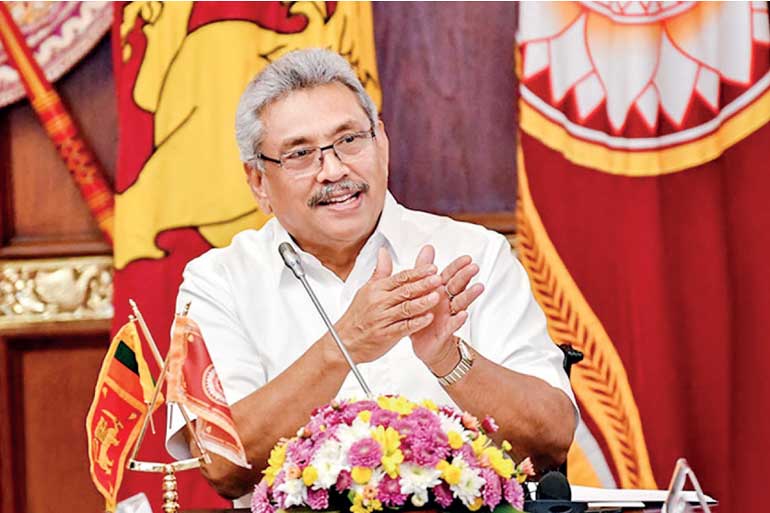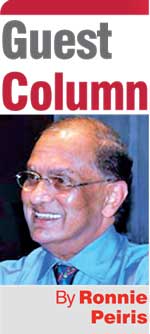Wednesday Mar 04, 2026
Wednesday Mar 04, 2026
Wednesday, 6 April 2022 00:11 - - {{hitsCtrl.values.hits}}

President Gotabaya Rajapaksa
 Great leaders not only take responsibility for their decisions and actions but also assume responsibility for the decisions and actions of those who directly, and indirectly report to them. Even if specifically unsaid, they acknowledge, through both word and deed, that such is the expectation which goes with the post.
Great leaders not only take responsibility for their decisions and actions but also assume responsibility for the decisions and actions of those who directly, and indirectly report to them. Even if specifically unsaid, they acknowledge, through both word and deed, that such is the expectation which goes with the post.
It is a principle which I closely relate to, and have unreservedly followed, in my corporate, sporting, and social life. Having been a leader, myself, in large corporations and having had the fortune of serving under, and observing, many leaders who were my role models in terms of their integrity, transparency, courage and vision, my leadership traits and behaviours were, and are, founded on the stance that a leader is ultimately responsible, and accountable, for anything, and everything, which happens in his shift. For example, the operating model at John Keells Holdings (JKH), though urging leaders to use majoritarian decision-making, makes it crystal clear that leaders carry the can and that the buck stops with them.
“The Buck Stops Here” was, and is, not a phrase to be used flippantly, but one which must only be used when there is fervour, and conviction, in conveying the acceptance of total responsibility and accountability. Even when they fail, great leaders believe in their abilities. By being honest, and open, with their failures, they learn from their mistakes. As the saying goes, true leaders pull the thumb before pointing the fingers. They are known to privately address the subordinates’ mistakes but publicly take the blame. In most instances, they even pass the credit. “The Buck Stops Here” was popularised by the 33rd President of the United States of America, Harry Truman, who kept a sign with that wording on his desk in the Oval Office in the White House. It was his way of telling the world that he took full responsibility for the decision to detonate two nuclear weapons over the cities of Hiroshima and Nagasaki in August 1945. The detonations, the first and the last of its kind, killed between 150,000 to 225,000 people and there is still debate as to whether such a harsh action was necessary at a time when the Japanese were contemplating surrender. Notwithstanding the “ifs” and “buts” and/or the “pros” and “cons,” of that action, the fact is that Harry Truman, the President of the USA, took responsibility for the decision.
The attitude, and response, of Sri Lanka’s leaders to the current economic crisis is a pathetic contrast to that exhibited by Truman and other admired leaders. It is during times of crisis, and when the chips are down, that we truly appreciate and value good leaders. At such times, we expect them to steady and steer the ship, keep us well-informed, direct efforts and act in ways that feel both human and authentic. Disappointingly, none of this is visible in the behaviour of the current leaders in Sri Lanka.
Placing matters in context – Sri Lanka is, currently, reeling in the face of a multitude of woes primarily brought upon by an illiquidity of dollars, a significant shortfall in the production of locally grown crops created by a poorly planned, and hastily adopted, fertiliser policy and inflationary pressures caused by the excessive printing of money giving rise to “too much money chasing too few goods”. These are irrefutable facts. Whilst one can accept that the current situation is an agglomeration of the short-sighted policies of successive governments, the President, and the Sri Lanka Podujana Peramuna (SLPP) controlled Parliament, have had ample time to address and/or prepare for the emerging dangers posed by a diminishing foreign currency reserves position and increasing food, and gas, shortages.
The writing has been on the wall over a long time. Despite the many a warning from experts, the President and the Parliament have paid scant heed to the emerging corollaries of inept management and have continued their merry-making ways by pursuing, and adopting, policies which encourage an entitlement culture, an import heavy lifestyle, appointments based on nepotism, and political connections and a work ethic where recognition and reward are not based on value-adding performance but based on what extent the servants complied with their masters’ bidding, irrespective of whether such bidding was in the best interest of the country.
Our leaders have, both literally and metaphorically, fiddled while Sri Lanka burnt. Let us be brutally honest about it, because if we are not, we cannot embark on a journey of finding solutions. The President and the SLPP led Parliament were elected by the people to make a difference. They were elected because they submitted that they have the capabilities to deliver a land flowing with milk and honey. A land where the citizens rightfully benefit from a government’s basic functions of providing leadership, maintaining law and order, facilitating freedom of expression, supplying public services, ensuring national security, and establishing an environment which gives opportunities to every person, irrespective of his caste, creed, race, rank, or station, to pursue his individual goals, objectives, dreams, aspirations, and ambitions.
It is in this light that we, the citizens of this wonderful country, must hold the present President and the present Parliament responsible for the country’s current predicament. Attempts by the leaders to cite COVID-19 and the Russian invasion of Ukraine as the main reasons for our current economic malaise must be treated as red herrings. The entire world was, and is, affected by COVID-19 and the entire world is affected by the Ukrainian war. But how many countries are in the same boat as Sri Lanka is? For example, as at end-January 2022, Bangladesh and India, our SAARC partners enjoy foreign currency reserves of $ 42 billion and 634 billion, respectively, despite suffering COVID-19 and Ukrainian war impacts.
Hope springs eternal and I am confident that we will, eventually, climb out of this deep hole which we have dug for ourselves. But, the speed, the extent and the sustainability of our recovery is dependent on our leaders accepting the blame and stating, “We are responsible for where we are today” and shouting out in unison that from today, “The Buck Stops Here.”
The transformation will not be easy. Strategies, and plans of action, must not be short-term. They must not be self-serving. We must accept that short to medium term sacrifices will be necessary if we are to attain long term prosperity. A period of austerity, and belt tightening, is inevitable. The leaders must be the role models. They must lead from the front and practice what they preach if such initiatives are to bear fruit and be sustainable.
Parallelly, the voting citizens must spend time on introspecting and must undergo “inner healing” through initiatives akin to South Africa’s Truth and Reconciliation Commission if they are to cleanse themselves of the deep-rooted prejudices which have been cunningly placed in the crevices of their hearts by scheming politicians. They must have clear minds in avoiding the mistakes of the past when electing national leaders, and representatives, who do not have the best interest of the country in their hearts. Most importantly they must elect leaders who understand, and live, by the maxim – “The Buck Stops Here.”